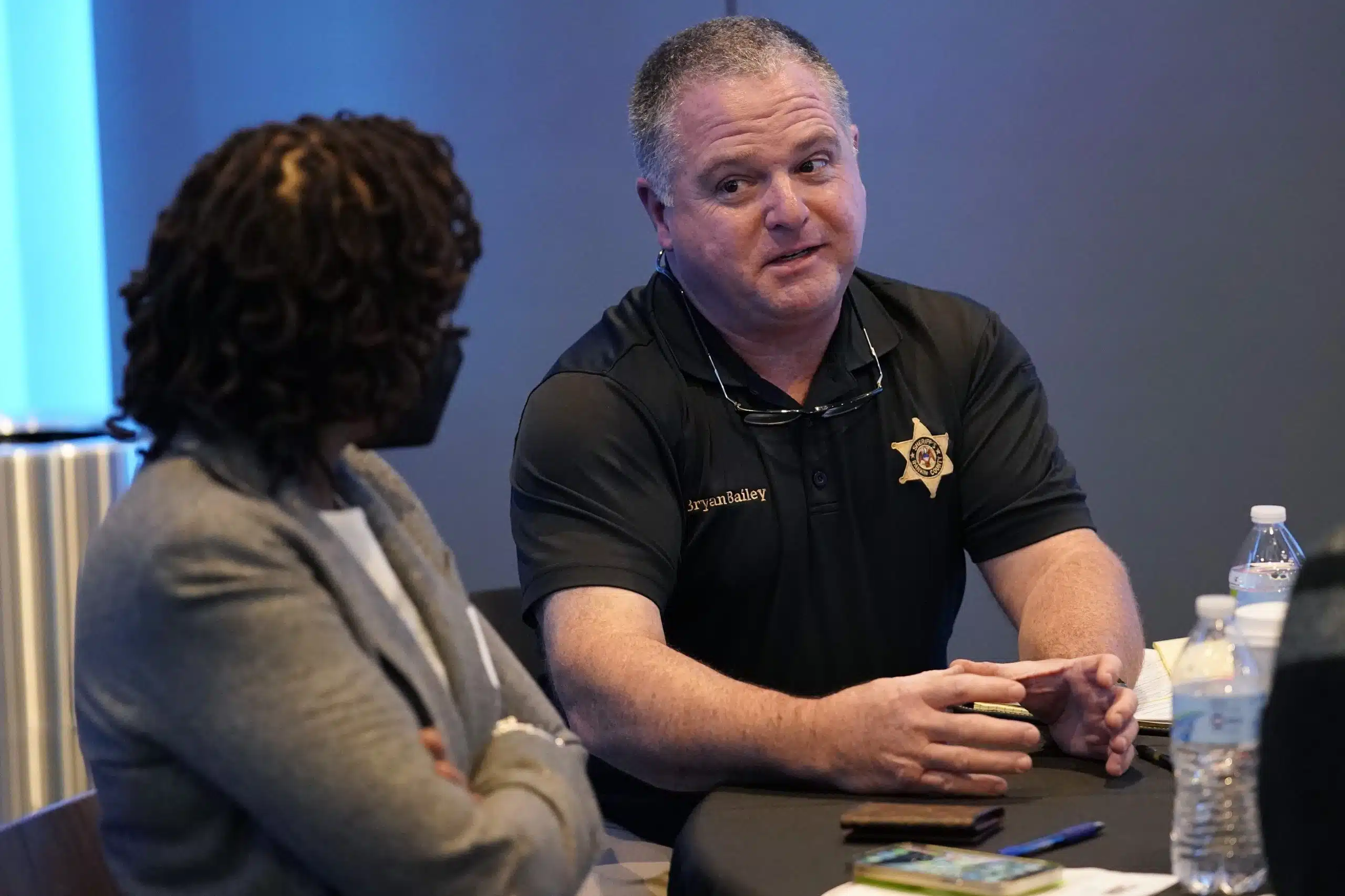Mississippi Today
Days after Rankin’s ‘Goon Squad’ tortured two men, supervisors gave the sheriff a pay boost

A dozen days after five Rankin County deputies known as the “Goon Squad” tortured, tased and sexually abused two Black men, the Rankin County Board of Supervisors gave Sheriff Bryan Bailey a $21,059 raise.
On Feb. 6, supervisors officially appointed him director of the Safe Room, a task he has carried out for years.
This means Bailey, a Republican incumbent unopposed in the Nov. 7 election, now earns $140,059 — what appears to be the highest pay for a Mississippi sheriff. It’s far more than the $122,160 salary Gov. Tate Reeves collects.
State Rep. Becky Currie, R-Brookhaven, said she believes the bonus circumvented the will of the state Legislature, which capped sheriffs’ salaries in counties of more than 100,000 population at $119,000. “We had just given sheriffs a big raise,” she said. “It’s just not right.”
The state’s legislative watchdog told her the raise was legal, but she said she still thinks the act “takes advantage of the taxpayers. I’m shocked the board of supervisors went along with it.”
Greta Kemp Martin, the Democratic candidate for Mississippi attorney general, said Sheriff Bailey has “proven himself to be unfit for the job” and should resign.
In addition to the Goon Squad’s actions, she pointed to reporting by The New York Times and Mississippi Today, which revealed the sheriff repeatedly used grand jury subpoenas to gather the text messages and phone call logs of his married girlfriend and a man he suspected she was seeing.
Before giving Bailey the raise, Rankin County supervisors sought an attorney general’s opinion, wanting to know if the sheriff could also be paid “for overseeing the FEMA safe room,” another name for the county’s severe weather shelter.
A written opinion from the attorney general’s office, which isn’t legally binding, concluded state law limiting the sheriff’s salary “would not apply to the compensation for his or her second job.”
What Rankin County officials didn’t mention to the attorney general’s office was that the sheriff had been in charge of the Safe Room for years.
The 16,400-square-foot facility hosts far more events and parties than storm evacuations. Most of the Rankin County policies for the Safe Room, built at a cost of $2.8 million to taxpayers, center on how groups can use the room for events ($50 an hour, plus a $250 deposit).
“Event themes must be approved by the Rankin County Sheriff and-or his designee and must be consistent with promoting community culture, recreation and education,” the policies read. “The Rankin County Sheriff’s Department accepts cash, checks and purchase orders made payable to Rankin County.”
U.S. Rep. Bennie Thompson, D-Miss., past chairman of the House Committee on Homeland Security, noted that the position over the Safe Room is usually held by a county’s emergency management director rather than a sheriff.
Brian Adam serves as emergency management director for Hancock County, which has five shelters. When those shelters open to the public, the Red Cross operates them, he said.
He doesn’t know of any sheriffs who manage shelters.
Asked why the Rankin County sheriff was getting paid now for a task he had done for years, Craig Slay, an attorney for the supervisors, responded that Bailey undertook that responsibility “voluntarily” and it “does not fall within his duties as Sheriff.”
While Bailey’s pay has skyrocketed, the number of employees at the Rankin County Sheriff’s Department is falling.
Current and former deputies say morale is plummeting, and more than two dozen people have left the office in recent months. They say they feel they lack the support of the sheriff, who said from now on, he had to “verify” their work.
After Rankin County Undersheriff Paul Holley resigned Oct. 2, Bailey sent out an email asking those in the office to “be patient during this transition. I have always tried to be a good leader but have my shortcomings. …
“I want to recover all that has been taken from us, especially our name and reputation. I cannot do it alone. I need our team to do it. If we all do our part and do our job, we can regain what was stolen from us.”
Weeks after five deputies and a Richland police officer pleaded guilty to torturing two Black men and planting a gun and drugs on them, citizens from the community appeared before the county supervisors.
“Those who are supposed to protect and serve have been serving out a brand of justice that is outside the boundaries of human dignity and decency,” resident Joe Brazeal told supervisors. “How long do you really think this has really been going on in our county?”
Someone in the audience answered, “Decades.”
Brazeal called for an investigation “going back as far back and as long ago as these officers who were carrying a badge.”
He asked the supervisors, “How many are incarcerated now or have been banished from this county because of planted evidence? This is your responsibility. Some of you were on watch.”
Supervisor Steve Gaines responded that the deputies’ crimes surprised him. “I’m sorry this happened,” he said. “I believe the sheriff is sorry this happened. Let’s respect our law enforcement and not let a few bad apples ruin everything.”
In response to those calling for Bailey’s resignation, Slay told the crowd that when people called on supervisors to remove the sheriff, those calls should go to the governor.
Mississippi law gives the governor the power to remove a county elected official if he or she receives a petition of 30 percent or more of the qualified voters.
“This board does not have the power to remove any county elected official,” Slay told the audience.
Bailey, first elected a dozen years ago, has rejected calls to resign. At a press conference following the officers’ guilty pleas, he denied having any prior knowledge of the deputies’ actions or even the existence of the Goon Squad, despite the fact that challenge coins for the Goon Squad were stamped with the seal of the Rankin County Sheriff’s Department.
He blamed his deputies for lying to him. “The only thing I’m guilty of is trusting grown men that swore an oath to do their job correctly,” he said. “I’m guilty of that.”
Instead, he blamed others at his office. “The complaint has to come in,” he said. “The reports have to come in. Something has to come in that I’ve been notified. That’s what I’ve got supervisors for.”
In response to questions about the crimes carried out by his deputies, the sheriff told reporters, “The system works.”
He said investigators for the Mississippi Bureau of Investigation “came in. They saw the red flags. Today, we have five former deputies in jail because they [MBI] came in and did their job.”
Greta Kemp Martin, whose father serves as police chief for the town of Tishomingo, said if Bailey had taken full responsibility for what happened, she might feel differently.
“Kicking the can to his supervisors is cowardly,” she said. “This was more than roughing up someone. This was torture.”
Martin, whose grandfathers also worked in law enforcement, said what the Goon Squad did “puts good cops at risk, because it deflates the public trust.”
Ilyssa Daly examines the power of sheriffs’ offices in Mississippi as part of The Times’s Local Investigations Fellowship. Jerry Mitchell, co-founder of the Mississippi Center for Investigative Reporting that’s now part of Mississippi Today, is an investigative reporter who has examined civil rights-era cold murder cases in the state for more than 30 years.
This article first appeared on Mississippi Today and is republished here under a Creative Commons license.
Mississippi Today
Brandon residents want answers, guarantees about data center
Residents of Brandon have raised concerns about the environmental impact and safety of a data center planned for their city.
AVAIO Digital, a Connecticut-based company, announced Aug. 19 that it plans to build a data center in Rankin County. While some celebrated the $6-billion investment and the over $20 million in annual tax revenue it would bring, other residents worry about the data center’s water and power consumption and possible pollution. The 600,000-square-foot facility is expected to be completed by 2027.
‘People genuinely just want answers’
When Nathan Rester first saw the news about the data center, he was immediately concerned. Rester grew up in Brandon and now lives there with his wife and toddler just a few miles from where the data center will be built.
READ MORE: Mississippi Marketplace: Another data center on the way
Rester had followed reports about the air pollution that people in and around Memphis have reported, a result of XAI constructing gas turbines without pollution controls normally used for such turbines. He didn’t want to see what was happening in Memphis happen in Brandon.
His wife, Larkyn Collier, made calls but found the answers unsatisfying.
“ No one could really give a straight answer on how it was being built, what sort of precautions were being taken, whether or not there had been any sort of consideration for utility costs or pollutants or anything like that,” Rester said
In response, Collier and Rester started a petition on change.org that now has over 430 signatures. The petition asks Rankin County leaders to guarantee the data center will not cause such problems. So far they have not received any communication from Rankin or Brandon government officials.
Rester is not completely opposed to the data center being built but he wants the government to guarantee it won’t bring utility bill hikes or pollution.
“ People genuinely just want answers and transparency here. And they want safeguards in place,” Rester said.
The AI boom comes to Mississippi
At their most basic level, data centers store computing equipment. They have been around since the 1940s and power things such as cloud storage. But with the boom in artificial intelligence investment, companies are rapidly constructing data centers across the globe.
The investment bank UBS estimates $375 billion will be spent globally on artificial intelligence in 2025. While this investment has fueled economic and technological growth, data centers have faced skepticism in the communities where they’re built, largely due to the amounts of energy and water they consume and possible pollution they emit.
Mississippi has two large-scale data center projects underway – Compass Datacenters in Meridian and Amazon in Madison County. Including the AVAIO data center, the three will add up to over $26 billion in new capital investment, an unprecedented amount for the state.
Cities and states are embracing data centers because of the potential economic growth, new taxes and innovation they bring.
“This investment is poised to create a lasting, positive impact on the city and the wider region,” Brandon Mayor Butch Lee said in a statement to Mississippi Today. “The project represents a major step forward for Brandon, bringing high-tech jobs and economic growth that will resonate throughout Rankin County and beyond.”
When the property is on the tax rolls and fully up and running, the ad valorem tax will bring in an estimated $23 million in new revenue according to Rankin First, the county’s economic development group. Most of it will go to the local school district.
“ These are not here today. And if we didn’t win this project, we would never see those,” said Garrett Wright, executive director of Rankin First, about tax revenue from the data center.
Rankin First, similar to many economic development groups, is not part of county government and is hired to attract new investment and cultivate existing businesses. It owns the land that the data center will be built on, which has been vacant for around 20 years.
AVAIO is eligible for the state’s data center tax incentive and fee in lieu of property tax. Companies pay a negotiated fee for a set period of time instead of the full property tax. The incentive is designed to encourage economic development. It requires sign off from the county board of supervisors, municipal authorities and Mississippi Development Authority, the state’s economic development agency.
It’s estimated AVAIO will create 60 direct jobs and the Amazon data center 300-400 direct jobs. While data centers create relatively few permanent, direct jobs they create additional jobs in the community. A McKinsey and Company report found that for every direct data center job, approximately 3.5 more jobs are created in the community.
Some residents on social media have wondered whether the data center will negatively impact traffic. Traffic and grade separation of the rail lines have been key conversations as Rankin County has grown. Rankin First acknowledged that AVAIO’s presence will increase traffic but they see it as an opportunity to push for long needed infrastructure improvements.
Rankin First and Brandon have been working with AVAIO for two years and says the company is coming to Brandon, in part, because of the thriving community.
“ The company wants to be a community partner. We see that they’re going to get involved with the local community,” said Regina Todd, assistant director of Rankin First.
Brandon residents want answers
Bailey Henry has lived in Brandon for over a decade. She said that when she read about the new data center on social media, she became concerned.
“ I’ve lived in Mississippi the majority of my life and I was raised to leave things better than you found it,” Henry said. “ And I just don’t think that Mississippi is going to be better off from this.”
Henry is worried about the pressure the data centers will put on the city’s infrastructure, pollution and power demands.
She describes the announcement as “ brief and nonchalant as all the explanations have been. From politicians to people who work for Entergy. It has just been, ‘This is what it is. It’s going to be great. Don’t ask any questions.’”
Henry has made calls to and left voicemails with multiple government offices and has not heard back from any of them.
She’s skeptical, but she hopes she’s wrong.
Brandon concerns echo nationwide conversation
The biggest concerns from residents nationwide over data centers has been potential pollution and increases in utility bills. Across the country, there are stories about data centers driving up energy rates, worsening water shortages, polluting the air and creating a constant noise.
AI data centers demand massive amounts of electricity and run constantly. The average AI data center uses as much electricity as 100,000 households, according to a report from the International Energy Agency.
Another concern is water usage. Data centers need to stay at a specific temperature, and water is one of the most efficient ways to cool the servers. The IEA report found that the average AI data center needs about 528,000 gallons of water every day. For communities that already have water concerns, data centers can exacerbate the problems.
Some communities have blamed the increased demand from data centers for rising electricity bills. While part of these costs may be due to general inflation or paying for infrastructure upgrades, some states are trying to monitor or regulate how households are affected.
A data center’s impact can vary based on the design of the center. But by their very nature they consume a lot of power.
“ AI chips are very power hungry. We’re building a lot of computing capacity, so we need to power all of this,” said Ahmed Saeed, a computer science assistant professor at Georgia Tech.
AVAIO promised “sustainable design,” including rainwater collection and solar panels that would “minimize power demands.” But it’s still unclear what, if any, impact the new data center will have on Rankin County residents.
“ Having clarity on the impact of data centers within the community where they’re building is important,” Saeed said. Saeed believes data centers are here to stay and are key for innovation. But he also thinks there’s a need for more government regulation.
“ They’re not necessarily a negative thing, but on the flip side, in order to make sure that they’re net positive it’s hard to ensure that without some regulation,” Saeed said.
Rankin County’s administrator declined to comment for this story. AVAIO and Brandon Water did not respond to requests for comment.
This article first appeared on Mississippi Today and is republished here under a Creative Commons Attribution-NoDerivatives 4.0 International License.
The post Brandon residents want answers, guarantees about data center appeared first on mississippitoday.org
Note: The following A.I. based commentary is not part of the original article, reproduced above, but is offered in the hopes that it will promote greater media literacy and critical thinking, by making any potential bias more visible to the reader –Staff Editor.
Political Bias Rating: Center-Left
This article presents a balanced view but leans slightly center-left by emphasizing environmental concerns, community impact, and the need for government transparency and regulation regarding the data center project. It highlights residents’ worries about pollution, utility costs, and infrastructure strain, while also acknowledging economic benefits and job creation. The focus on environmental and social accountability alongside economic development aligns with a center-left perspective that values both growth and sustainability.
Mississippi Today
Democratic DA Scott Colom announces U.S. Senate run against Hyde-Smith
Scott Colom, a Democratic district attorney in north Mississippi, announced today that he will run for the U.S. Senate next year against incumbent Republican Cindy Hyde-Smith.
Colom’s entrance into the race is likely to spark a long and expensive battle for the seat, with both national parties expected to spend millions on the race in the Magnolia State.
Chuck Schumer, the Senate’s Democratic leader from New York, told the New York Times he wants to help elect a Democrat in Mississippi. But the Republican Party is almost certain to defend its ironclad grip on Mississippi, a state where both U.S. Senate seats have been held by the GOP since 1989.
In an interview with Mississippi Today ahead of his announcement, Colom said he intends to cast Hyde-Smith’s voting record as prioritizing “D.C. politics” instead of hard-working Mississippians, including her vote for the “One Big Beautiful Bill” that slashed social safety net programs and provided tax cuts for the wealthy.
“Mississippi needs a senator who’s going to put Mississippi first,” Colom said.
But Colom faces an uphill battle. He’s a Democrat running in Mississippi, with one of the most reliably conservative electorates in the nation.
Mississippi last elected a Democrat to the U.S. Senate in 1982, when it reelected John Stennis. A majority of Mississippians have voted for the Republican nominee for president since 1980.
Still, Colom said he can crack the GOP’s stronghold in the state because he has experience with pitching moderate and progressive solutions to a more conservative electorate, as he did when he defeated long-serving incumbent Forrest Allgood, an independent, for district attorney in 2015.
“At the time, people didn’t think I could win the DA’s race,” Colom said.
A native of Columbus, Colom is the elected district attorney of the 16th Circuit Court District, which includes Lowndes, Oktibbeha, Clay and Noxubee counties. He is the first Black DA for the district.
He first won that election by casting his opponent as an incredibly harsh prosecutor who was more concerned with obtaining stiff sentences for convicted criminals than true rehabilitation. After Colom took office, he said he focused his office’s efforts on tackling violent crime and promoting alternative sentencing for nonviolent offenders.
“I have faith that the truth always sees through if you get the message out, speak with conviction and lead with your values,” Colom said. “That’s my plan. I want to speak with my values.”
For example, Colom said he would push for legislation that raises the nation’s minimum wage and exempts law enforcement officers and public school teachers from paying federal income taxes.
This may be the first time the two have competed head-to-head, but it will not be the first time Colom and Hyde-Smith have butted heads. Former President Joe Biden in 2023 nominated Colom to a vacant federal judicial seat in northern Mississippi, but Hyde-Smith thwarted the nomination.
Despite support for Colom from Roger Wicker, Mississippi’s senior U.S. senator, Hyde-Smith was able to block his nomination because of a longstanding tradition in the U.S. Senate that requires senators from a nominee’s home state to submit “blue slips” if they approve of the candidate.
Hyde-Smith never returned one of these slips for Colom. If both senators don’t submit a blue slip, the nominee typically does not advance to a confirmation hearing before the Senate Judiciary Committee.
Hyde-Smith, at her reelection launch last week, mentioned her opposition to Colom’s elevation to the federal bench.
“He thought he was going to be a federal judge, and I blocked him,” Hyde-Smith said to applause.
Colom is the first Democrat to announce his candidacy for the Senate seat. Ty Pinkins, an unsuccessful Democratic candidate for U.S. Senate in 2024, has declared he’s also running for the Senate again in 2026 as an independent.
This article first appeared on Mississippi Today and is republished here under a Creative Commons Attribution-NoDerivatives 4.0 International License.
The post Democratic DA Scott Colom announces U.S. Senate run against Hyde-Smith appeared first on mississippitoday.org
Note: The following A.I. based commentary is not part of the original article, reproduced above, but is offered in the hopes that it will promote greater media literacy and critical thinking, by making any potential bias more visible to the reader –Staff Editor.
Political Bias Rating: Center-Left
The article presents a factual overview of Democratic candidate Scott Colom’s Senate run against Republican Cindy Hyde-Smith, highlighting Colom’s progressive policy positions such as raising the minimum wage and critiquing Hyde-Smith’s voting record on social safety net cuts. While it includes perspectives from both sides and contextualizes Mississippi’s conservative political landscape, the emphasis on Colom’s values and policy proposals, along with critical framing of Hyde-Smith’s record, suggests a slight lean toward a center-left viewpoint. The tone remains largely informative without overt partisan language.
Mississippi Today
Trump proposed getting rid of FEMA, but his review council seems focused on reforming the agency
Four days after starting his second administration, President Donald Trump floated the idea of ” getting rid of ” the Federal Emergency Management Agency, which manages federal disaster response.
But at a meeting last week, the 12-person review council he appointed to propose changes to FEMA seemed more focused on reforms than total dismantlement.
FEMA must be “reformed into an agency that is supporting our local and state officials that are there on the ground and responsive to the individuals that are necessary to help people be healed and whole through these situations,” said Homeland Security Secretary Kristi Noem, who co-chairs the council. But, she added, FEMA “as it exists today needs to be eliminated.”
However, the meeting Thursday in Oklahoma City offered hints of what types of reforms the council might present to Trump in its final report. Members mainly focused on conventional and oft-cited opportunities for change, such as getting money faster to states and survivors and enhancing the capacity of local emergency managers.
But some moves by the administration in the last several months have already undermined those goals, as mitigation programs are cut and the FEMA workforce is reduced. Experts also caution that no matter what the council proposes, changes to FEMA’s authority and operations require congressional action.
A Republican-dominated council
Trump created the FEMA Review Council through a January executive order instructing the group to solicit feedback from a “broad range of stakeholders” and to deliver a report to him on recommended changes within 180 days of its first meeting, though that deadline has lapsed.
The 12-person council is co-chaired by Noem and Defense Secretary Pete Hegseth and vice-chaired by former Mississippi Gov. Phil Bryant. It is made up of elected officials, emergency managers and other leaders mostly from Republican states.
Trump “believes we should be in a disaster-response portfolio and footprint,” Noem said at Thursday’s meeting, “but the long-term mitigation should not be something that the federal government is continuing to be involved in to the extent that it has been in the past.”
Noem attended virtually, citing efforts toward “bringing some peace to the streets of Washington, D.C.”
Members on Thursday presented some findings collected in listening sessions conducted in multiple states and with Native tribes. Much of the discussion touched on the need to get money to states more quickly and with more flexibility. Trump and Noem have both supported the idea of giving states federal block grants quickly after a disaster instead of the current reimbursement model.
Members have spent “hours, maybe even days, exploring ways to accelerate local recovery through direct funding for public and individual assistance,” Guthrie said.
Making plans beforehand
Several members emphasized improving preparedness and mitigation before disasters hit.
“Mitigation saves lives, it protects property, it reduces cost of future disasters,” said Guthrie, but added that more responsibility should fall on individuals and state and local governments to invest in mitigation.
States like Texas and Florida have robust, well-funded emergency management agencies prepared for major disasters. Members acknowledged that if other state and local governments were to take on more responsibility in disasters, they still needed training support.
Methods for governments to unlock recovery dollars without relying on federal funds also came up, such as parametric insurance, which provides a rapid payout of a previously agreed-upon amount when a triggering event occurs.
The meeting focused less on individual survivor support, but Bryant brought up the need to reform — and protect — the National Flood Insurance Program, calling it “vital.” That program was created by Congress more than 50 years ago because many private insurers stopped offering policies in high-risk areas.
The rhetoric around FEMA is evolving
The conversation signaled a departure from some of the more aggressive rhetoric Trump and Noem have used in the past to describe their plans for FEMA. As recently as June, Trump suggested ” phasing out ” the agency after the 2025 hurricane season.
Michael Coen, who held FEMA posts under three presidential administrations, said after three council meetings, recommendations remain vague.
“Council members provided their perspective but have not identified the challenge they are trying to solve or offered a new way forward,” Coen said.
Coen also cautioned that any significant changes must go through Congress. Lawmakers in July introduced a bipartisan reform bill in the House. The so-called FEMA Act echoes some of the council’s priorities, but also proposes returning FEMA to a Cabinet-level agency.
“Most current proposed FEMA legislation strengthens FEMA,” said Coen.
Actions sometimes contradict words
Some of the administration’s actions so far contradict council members’ emphasis on expediency, mitigation and preparedness.
Noem now requires that she personally approve any DHS expenditure over $100,000. That policy led to delays in the Texas response, according to several reports, though Noem and acting administrator David Richardson have refuted those claims.
The administration halted a multibillion-dollar program for climate resilience projects, and Trump stopped approving hazard mitigation funding requests for major disasters. FEMA abruptly canceled or moved online some local preparedness trainings this spring, though many later resumed.
On Aug. 25, more than 180 current and former FEMA staff sent an opposition letter to the FEMA Review Council and Congress, warning that the agency is so diminished that a major climate event could lead to catastrophe.
At least some of the staff were put on paid administrative leave until further notice on Aug. 26.
This report is by Gabriela Aoun Angueira of The Associated Press.
This article first appeared on Mississippi Today and is republished here under a Creative Commons Attribution-NoDerivatives 4.0 International License.
The post Trump proposed getting rid of FEMA, but his review council seems focused on reforming the agency appeared first on mississippitoday.org
Note: The following A.I. based commentary is not part of the original article, reproduced above, but is offered in the hopes that it will promote greater media literacy and critical thinking, by making any potential bias more visible to the reader –Staff Editor.
Political Bias Rating: Center-Right
The article presents a factual and measured overview of President Trump’s approach to FEMA, highlighting both his initial proposal to eliminate the agency and the more moderate reform efforts by his appointed council. It includes perspectives from Republican officials and acknowledges criticisms and concerns from experts and former FEMA staff. The tone is largely neutral but leans slightly toward a center-right viewpoint due to the focus on conservative figures and policies emphasizing state and local control over federal disaster management.
-
Mississippi Today4 days ago
DEI, campus culture wars spark early battle between likely GOP rivals for governor in Mississippi
-
News from the South - North Carolina News Feed7 days ago
Parasocial party: Why people are excited for the Taylor Swift, Travis Kelce engagement
-
Local News6 days ago
Police say Minneapolis church shooter was filled with hatred and admired mass killers
-
Local News Video6 days ago
08/29 Ryan's “Wet End to the Week” Friday Forecast
-
News from the South - Kentucky News Feed6 days ago
Lexington Man Convicted of Firearms Offenses
-
Mississippi Today7 days ago
Two Mississippi media companies appeal Supreme Court ruling on sealed court files
-
News from the South - Arkansas News Feed6 days ago
Sylvan Hills defeats Maumelle in Zero Week thriller
-
Our Mississippi Home7 days ago
From the Publisher: The Storm Before Our Wedding: A Katrina Memory
















































